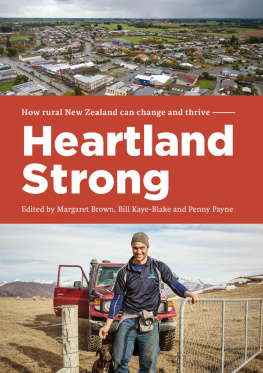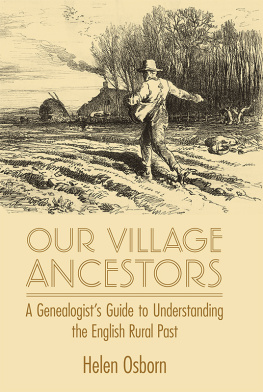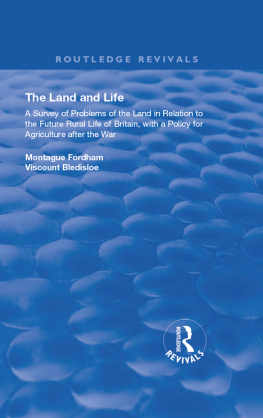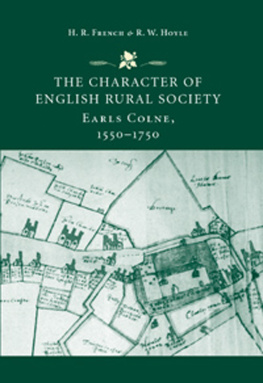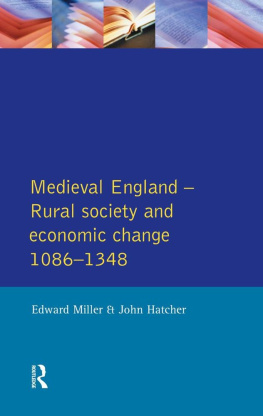
Studies in Regional and Local History
General Editor Jane Whittle
Previous titles in this series
Founding Editor Nigel Goose
Volume 1: A Hertfordshire demesne of Westminster Abbey: Profits, productivity and weather by Derek Vincent Stern (edited and with an introduction by Christopher Thornton)
Volume 2: From Hellgill to Bridge End: Aspects of economic and social change in the Upper Eden Valley, 184095 by Margaret Shepherd
Volume 3: Cambridge and its Economic Region, 14501560 by John S. Lee
Volume 4: Cultural Transition in the Chilterns and Essex Region, 350 AD to 650 AD by John T. Baker
Volume 5: A Pleasing Prospect: Society and culture in eighteenth-century Colchester by Shani DCruze
Volume 6: Agriculture and Rural Society after the Black Death: Common themes and regional variations by Ben Dodds and Richard Britnell
Volume 7: A Lost Frontier Revealed: Regional separation in the East Midlands by Alan Fox
Volume 8: Land and Family: Trends and local variations in the peasant land market on the Winchester bishopric estates, 12631415 by John Mullan and Richard Britnell
Volume 9: Out of the Hay and into the Hops: Hop cultivation in Wealden Kent and hop marketing in Southwark, 17442000 by Celia Cordle
Volume 10: A Prospering Society: Wiltshire in the later Middle Ages by John Hare
Volume 11: Bread and Ale for the Brethren: The provisioning of Norwich Cathedral Priory, 12601536 by Philip Slavin
Volume 12: Poor Relief and Community in Hadleigh, Suffolk, 15471600 by Marjorie Keniston McIntosh
Volume 13: Rethinking Ancient Woodland: The archaeology and history of woods in Norfolk by Gerry Barnes and Tom Williamson
First published in Great Britain in 2016 by
University of Hertfordshire Press
College Lane
Hatfield
Hertfordshire
AL10 9AB
UK
individual contributors 2016
The right of J.P. Bowen and A.T. Brown to be identified as the editors of this work has been asserted by them in accordance with the Copyright, Designs and Patents Act 1988.
All rights reserved. No part of this book may be reproduced or utilised in any form or by any means, electronic or mechanical, including photocopying, recording or by any information storage and retrieval system, without permission in writing from the publisher.
British Library Cataloguing in Publication Data
A catalogue record for this book is available from the British Library
ISBN 978-1-909291-44-7 hardback
ISBN 978-1-909291-45-4 paperback
Design by Arthouse Publishing Solutions Ltd
Printed in Great Britain by Henry Ling Ltd, Dorchester
Contents
Introduction: Custom and commercialisation in English rural society
James P. Bowen and A.T. Brown
1 Tawney and Postan: two pathways to understanding the pre-industrial economy
Christopher Dyer
2 Rural industry and the peasant agrarian economy: a study of the iron industry in medieval England
Alexandra Sapoznik
3 English agrarian structures in a European context, 13001925
John Broad
4 Farming the Kentish marshlands: continuity and change in the late Middle Ages
Sheila Sweetinburgh
5 The struggle for the commons: commons, custom and cottages in Shropshire during the sixteenth and seventeenth centuries
James P. Bowen
6 The economics of shipwreck in late medieval Suffolk
Tom Johnson
7 Custom and competition for woodland resources in early modern High and Low Furness, Lancashire
William D. Shannon
8 Custom, common right and commercialisation in the Forest of Dean, c.160540
Simon Sandall
9 A money economy? Provisioning Durham Cathedral across the dissolution, 13501600
A.T. Brown
10 Elizabethan entrepreneurs: three clothiers of the Frome Valley, 15501600 203
John Gaisford
11 The fellowship of the town: constituting the commonality of an English country town, Cirencester, c.12001800
David Rollison
Afterword: Small places, big questions: reintegrating social and economic history, c.13501750
Andy Wood
Index
Figures
Tables
Contributors
Dr James P. Bowen is a Postdoctoral Research Associate based at the Department of Geography and Planning, the School of Environmental Sciences, University of Liverpool. He is working on Spaces of experience and horizons of expectation: the implications of extreme weather events, past, present and future, a three-year project funded as part of the Care for the Future programme of the Arts and Humanities Research Council (AHRC). He completed a PhD at Lancaster University supervised by Professor Angus J.L. Winchester and held the Economic History Societys Tawney Fellowship in 201213.
Dr John Broad is an Affiliated Researcher of the Cambridge Group for the History of Population and Social Structure (CAMPOP) at the University of Cambridge. Since publishing Transforming English Rural Society: The Verneys and the Claydons 1600 1820 (Cambridge University Press, 2004) he has edited A Common Agricultural Heritage? (2009), Bishop Wakes Summary Visitation Returns (2012) and (with Anton Shuurman) Wealth and Poverty in European Rural Societies (2014).
Dr A.T. Brown is an Addison Wheeler Fellow at Durham University, having previously held the Economic History Societys Postan Fellowship in 201213. His book Rural Society and Economic Change in County Durham: Recession and Recovery, c.1400 1640 was published in 2015 with Boydell Press. He co-edited (with Andy Burn and Rob Doherty) Crises in Economic and Social History: A Comparative Perspective (Boydell Press, 2015) and has published articles on the ecclesiastical estates of Durham in the Economic History Review and Northern History.
Professor Christopher Dyer, Emeritus Professor of History at the University of Leicester, has written on various aspects of agrarian, landscape and rural history, mainly in the later Middle Ages. His most recent book, published by Oxford University Press in 2012, is A Country Merchant, 14951520: Trading and Farming at the End of the Middle Ages.
Dr John Gaisford wrote his PhD on Capital in the Countryside: Social Change in West Wiltshire, 15301680, supervised by Professor Vanessa Harding at Birkbeck, University of London. His study investigated the social impact of the Western broadcloth trade, with particular reference to contact with the London merchant community and the Exchequer, and the effects of competition and co-operation amongst entrepreneurs in the West Country.
Dr Tom Johnson is Lecturer in Late Medieval History at the University of York, having previously held a research fellowship at Emmanuel College, Cambridge. He has published articles on medieval law and society in Law & History Review and American Historical Review, and is currently working on a monograph about popular legal culture in fifteenth-century England.


